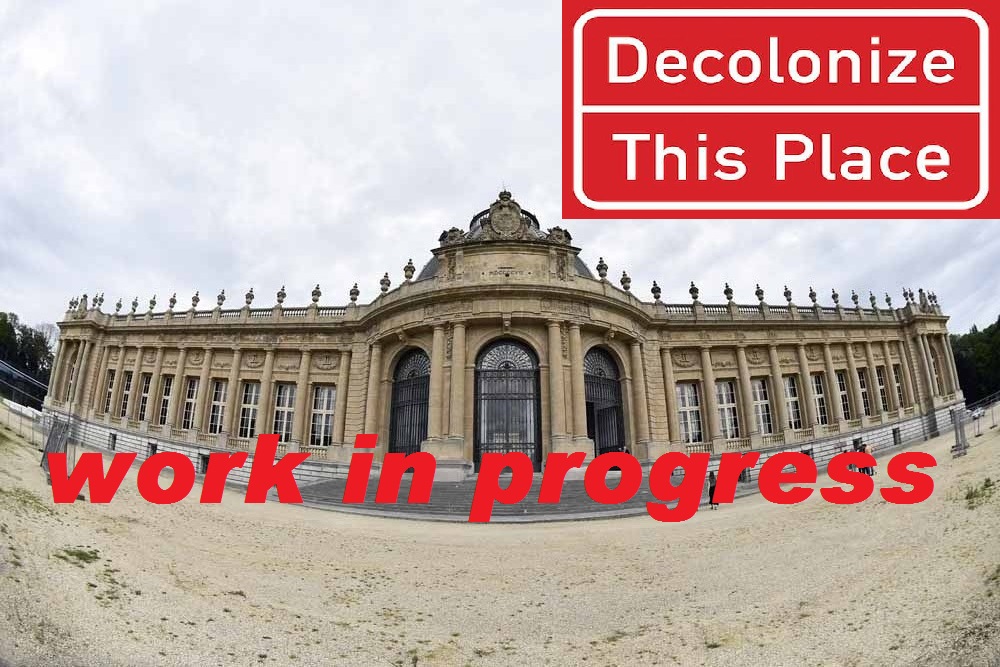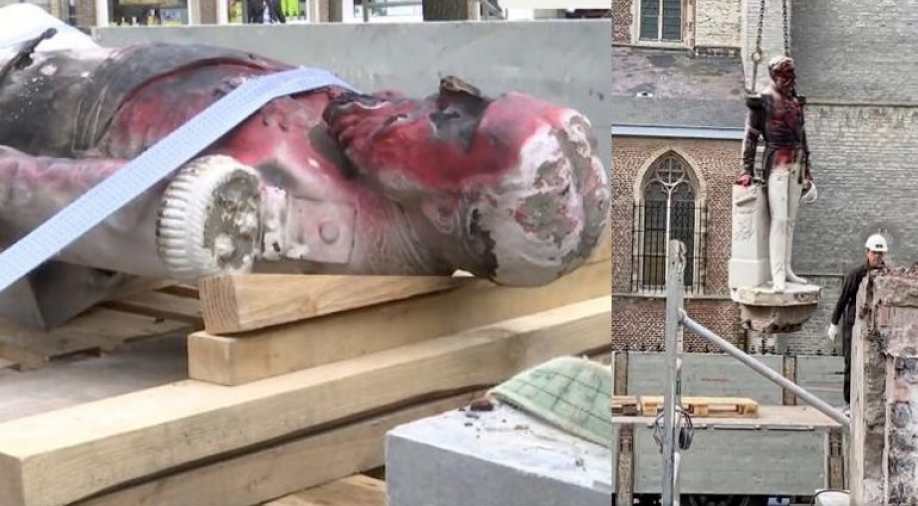Le 17 juillet 2020, j’ai été officiellement invité à devenir membre du groupe d’experts qui doit assister la Commission spéciale du Parlement belge chargée de : ′′ het onderzoek over Congo-Vrijstaat (1885) en het Belgech koloniaal verleden au Congo (1908-1960), Rwanda au Burundi (1919-1962), de l’impact hiérarchique sur le gevolgen d’un mot ′′ (recherche du Congo Free State (1885-1908) et du passé colonial belge au Congo (1908-1960), au Rwanda et au Burundi (1919-1962), et l’impact et les implications qui doivent être tirées de cela)
Ci-dessous la lettre que j’ai rédigée (en néerlandais) et envoyée en réponse expliquant pourquoi je ne peux pas participer au groupe d’experts. (à un moment donné je trouverai l’énergie pour traduire cela dans un langage moins obscur ![]() )
)
Johannesburg, 21 juillet 2020
On July 17th 2020 I was officially invited to become a member of the expert group that is to assist the Special Commission of the Belgian Parliament tasked with: “het onderzoek over Congo-Vrijstaat (1885 – 1908) en het Belgisch koloniaal verleden in Congo (1908-1960), Rwanda en Burundi (1919-1962), de impact hiervan en de gevolgen die hieraan dienen gegeven te worden” (researching Congo Free state (1885-1908) and Belgian colonial past in Congo (1908-1960), Rwanda and Burundi (1919-1962), and the impact and implications that need to be drawn from this)
Below is the letter I drafted (in Dutch) and sent in response, explaining why I cannot partake in the expert group. (at some point I’ll find the energy to translate this in a less obscure language ![]() )
)
Johannesburg, 21 juli 2020
The English version follows below. (my gratitude to my sister-comrade Jonneke Koomen for the translation!)
***
[NL]
Johannesburg, 21 juli 2020
Betreft: Uitnodiging experten groep Bijzondere commissie belast met het onderzoek over Congo-Vrijstaat (1885 – 1908) en het Belgisch koloniaal verleden in Congo (1908-1960), Rwanda en Burundi (1919-1962), de impact hiervan en de gevolgen die hieraan dienen gegeven te worden
Ter attentie van de leden van de Bijzondere Kamercommissie,
Hartelijk dank voor deze uitnodiging. Ik feliciteer de betrokken parlementsleden met het nemen van dit initiatief. Het koloniaal verleden en heden recht in de ogen kijken, is iets waar de Afrikaanse en andere koloniale diaspora in ons land en wereldwijd al minstens een halve eeuw op aandringen.
Het is vanuit die optiek dat ik niet kan ingaan op uw uitnodiging om deel uit te maken van de experten groep.
De (a) plaats van die diaspora en de definitie van ‘expertise’ in de context van deze groep en de oprichtingsnota, en (b) het ritme, agenda en volgorde van de werkzaamheden die daaruit voortvloeien, brengt de gedragenheid van dit project van meet af aan in gevaar en riskeert de logica’s en reflexen van de Witte Wereld in het centrum van dit initiatief te houden.
Plaats van de diaspora en definitie expertise: de nagenoeg algehele afwezigheid van de koloniale diaspora in de machtscentra van onze samenleving, inclusief onze parlementen en academische wereld, a) verklaart mede waarom het zo lang geduurd heeft en b) dwingt ons ertoe te begrijpen dat het initiatief en de initiatiefnemers in de context van het parlement met een gigantisch deficit in legitimiteit en competentie/inzicht kampen. Dit vraagt om extra waakzaamheid over wie er aan het stuur/in de cockpit zit om de richting van deze Commissie mee vorm te geven (agenda), en door wie en op welke manier hierover wordt beslist. De traditionele definitie van expertise als ‘academisch’ is in deze onwaarschijnlijk problematisch, aangezien dat zij die al een halve eeuw om dit gesprek vragen en de ervaringsdeskundigen zijn van de gevolgen van kolonisatie in hun dagdagelijkse leven (zowel in België als in de voormalige kolonies) het initiatiefrecht is ontnomen om deze Commissie inhoud en richting te geven. Het feit dat er in eerste instantie naar het Afrika Museum (de bijna letterlijke belichaming van het Belgisch koloniaal verleden dat niet radicaal, maar hoogstens kosmetisch wordt verworpen) werd gekeken om de lijst van experten samen te stellen is dan geen technisch foutje maar een meer fundamenteel symptoom van hoe deze onderneming riskeert de Witte Wereld logica (waar ‘wetenschap’ en koloniale instellingen zoals de universiteit tegen alle logica in de experten van dienst blijven) in het centrum van de dekolonisatie processen te houden.
Ritme, agenda en volgorde: Eens we de ervaringsdeskundigen van de kolonisatie in het centrum van onze definitie van expertise plaatsen, begrijpen we ook dat de extreme snelheid waarmee dit initiatief op de voorgrond trad, niet houdbaar is, en een eerste rapport tegen oktober al evenmin. Decennialange verdeel en heers logica heeft de verschillende koloniale diaspora in België (die, als we naar hedendaagse postkoloniale problematieken van racisme en armoede kijken, veel verder reikt dan de Congolese, Rwandese en Burundese gemeenschappen, maar bijvoorbeeld ook de Marokkaanse en Turkse gemeenschappen, of de recentere migratie gemeenschappen als ook de vele organisaties en initiatieven die mensen over de verschillende gemeenschappen heen samenbrengen) tegen elkaar uitgespeeld en het mogelijke antikoloniale landschap versnipperd. Een initiatief dat op een paar weken tijd een lijst van academici als individuen in de cockpit van het project duwt, riskeert ongewild deze verdeel en heers logica te reproduceren.
Coalitievorming en gedragenheid vragen tijd. Gedragen agendasetting ook.
Dit initiatief had er beter aan gedaan om een open oproep te lanceren naar de gemeenschappen over wie zij naar voor schuiven voor zo’n experten groep en wat de volgorde en inhoud van dit dekoloniaal initiatief zou moeten zijn. Hiervoor zijn maanden, misschien wel een jaar nodig. Hierrond werden en worden al de nodige initiatieven genomen. Uit zo’n consultatie zou misschien blijken dat het historische ‘waarheid’ luikje veel minder tijd en energie vergt en zeker niet het eerste agendapunt zou moeten zijn. Of dat die waarheid heel anders geformuleerd wordt dan in de bestaande (academische) geschiedenisboeken. Misschien ook dat een ‘Congo’ Commissie niet in eerste instantie een aangelegenheid van Buitenlandse Zaken is maar vooral (ook) Binnenlandse Zaken, arbeid, onderwijs, economie, media, huisvesting, politie en gevangeniswezen, …
Het lijkt me bijzonder belangrijk dat de Commissie van meet af (en niet als een verhoopt resultaat in een verre toekomst) aandacht heeft voor een radicale verschuiving van de macht in dit gesprek en de initiatieven die hieruit zullen voortvloeien. Dat is tenslotte waar dekolonisatie en het uitroeien van racisme om gaan. Dit vraagt om een openheid en bereidheid naar andere snelheden, prioriteiten, risico’s nemen en experimenteren toe. Anders wordt dit een kosmetische operatie ten dienste van de status quo, maar dan met de gevaarlijk en jammerlijke indruk ‘dat we er toch iets aan gedaan hebben.’
Dit zou een halve eeuw na datum een pijnlijke gemiste kans zijn.
Ik bedank u nogmaals voor de uitnodiging en wens alle betrokkenen erg veel succes met deze belangrijke historische opdracht.
Met vriendelijke groeten,
Dr. Olivia U. Rutazibwa
Senior Lecturer International (Development) Studies, University of Portsmouth olivia.rutazibwa@port.ac.uk
***
[ENG]
Johannesburg, July 21th, 2020
Ref: Invitation to join the group of experts for the Special Commission responsible for investigating the Congo-Free State (1885-1908) and the Belgian colonial past in the Congo (1908-1960), Rwanda and Burundi (1919-1962), and the impacts and implications.
To the members of the Special Legislative Commission:
Thank you very much for this invitation. I congratulate the Members of Parliament involved, with taking this initiative. For over half a century, African and other colonial diaspora in our country and worldwide have been demanding that the colonial past and present be faced head on.
It is with this in mind that I cannot accept your invitation to be part of the expert group.
(a) The place of the diaspora and the understanding of ‘expertise’ in the context of this group and its founding document, and (b) relatedly, the timeline, pace, agenda and sequence of the proceedings, endanger, from day one, the democratic deficit of this project and risk maintaining the logics and reflexes of the White World at the centre of this initiative.
The place of diaspora and the understanding of expertise: Colonial diaspora are as good as entirely absent from the corridors of power in our society, including Parliament and academia. This (a) explains in part why it took so long and b) it forces us to see that this initiative and those who took it, suffer from a huge deficit of legitimacy, competence and insight. We therefore need a heightened vigilance over who sits in the cockpit, steers this Commission and its agenda, and who gets to decide this and how. The traditional understanding of expertise as ‘academic’ knowledge is as such then incredibly problematic, given that those who have been asking for this conversation for half a century and are the expert witnesses of the consequences of colonisation in their daily lives (both in Belgium and in the former colonies), have been robbed of their right of initiative to give this Commission substance and direction. The very fact that the Africa Museum (an almost literal embodiment of the Belgian colonial past from which no radical, but only a cosmetic, detachment seems possible) was initially tasked with compiling the list of experts is then not a technical glitch but rather a more fundamental symptom of how this initiative risks maintaining the White World logic (where academia and scientific colonial institutions such as the university remain, against all evidence, seen as experts) at the heart of the decolonisation processes.
Pace, agenda and sequence: Once we place the expert witnesses at the centre of our understanding of expertise, it becomes clear that the extreme speed with which this initiative was launched is untenable, as is producing a first report by October. For decades, the divide and rule logic has pitted different colonial diaspora communities in Belgium against each other, fragmenting the anti-colonial landscape (if we consider contemporary postcolonial problems of racism and poverty, the colonial diaspora reaches far beyond the Congolese, Rwandan and Burundian communities to include Moroccan and Turkish communities, for example, as well as the more recent migrant communities, and the many organizations and initiatives that bring people together across different communities). An initiative that – in just a few weeks – is pushing a list of academics as individuals into the project’s driving seat, unwittingly risks reproducing this divide and rule logic.
Building coalitions and democratic legitimacy require time. Legitimate agenda setting does too.
This initiative would have benefitted from an open call to the communities concerned about who they would like to put forward for an expert group and what they think the sequence and content of this decolonial initiative should be. Such a process requires months, maybe a year. (These types of consultations have been and are already ongoing within and amongst the communities.)
Such consultations might show that the historical ‘truth’ item might not need that much time and energy and should certainly not be the first one on the agenda. Or that that truth looks very different from what we find in existing (academic) history books. Maybe also that a ‘Congo’ Commission is not (first and foremost) a matter for the Ministry of Foreign Affairs but concerns above all (also) Home Affairs, labour, education, the economy, media, housing, police and the carceral system,…
I believe it is particularly important that, from the outset (and not as an aspiration in a distant future), the Commission ensures a radical shift and dislocation of power in this conversation and the initiatives that will follow. After all, this is what decolonisation and the eradication of racism is all about. This requires an openness and willingness to consider different speeds, priorities, risk-taking and experimenting. If not, this initiative will be a cosmetic operation at the service of the status quo, but with the added dangerous and deplorable impression that “at least we did something.”
This would, more than half a century after the facts, be a painful missed opportunity.
I thank you once again for the invitation and I wish everyone involved the best of luck with this important historic task.
With kind regards,
Dr. Olivia U. Rutazibwa
Senior Lecturer International (Development) Studies, University of Portsmouth olivia.rutazibwa@port.ac.uk


